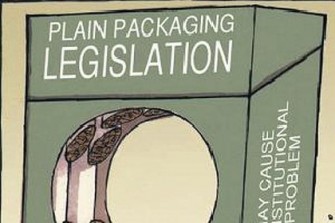 In late May, global tobacco giants Philip Morris International (PMI), British American Tobacco (BAT), and Japan Tobacco International (JTI) sued the British government over new legislation that will introduce plain tobacco packaging to the UK in May 2016. The British legislation, aimed at curbing demand for cigarettes, requires that all cigarettes be sold in uniform packs with all branding, including colors, logos and other trademarks, removed. Companies are only permitted to print the brand’s name, in a uniform font, size, and location, on the pack, alongside health warnings and deterrent images. Other tobacco companies, such as Imperial Tobacco, have indicated that they will “be left with no choice” but to challenge the regulations as well.
In late May, global tobacco giants Philip Morris International (PMI), British American Tobacco (BAT), and Japan Tobacco International (JTI) sued the British government over new legislation that will introduce plain tobacco packaging to the UK in May 2016. The British legislation, aimed at curbing demand for cigarettes, requires that all cigarettes be sold in uniform packs with all branding, including colors, logos and other trademarks, removed. Companies are only permitted to print the brand’s name, in a uniform font, size, and location, on the pack, alongside health warnings and deterrent images. Other tobacco companies, such as Imperial Tobacco, have indicated that they will “be left with no choice” but to challenge the regulations as well.
The tobacco companies allege that the government’s plain packaging rules deprive them of property in the form of trademarks, and seek compensation that could extend into the billions of pounds. Specifically, the tobacco companies’ assert: (1) the regulations unlawfully deprive tobacco companies of their trademarks, in contravention of English and EU law prohibiting depriving private entities of property without fair compensation; (2) the regulations violate the EU law that says community trademarks can be used by identical means throughout the EU, which would be impossible if the UK government bans their use in the UK; and (3) the regulations obstruct the free movement of goods through means that are neither necessary nor proportionate to achieving the UK government’s public health objectives.
In 2011, Australia became the first country to pass plain packaging legislation, which took effect in December 2012. At the time, BAT, which had 46% of the tobacco market share in Australia, challenged the decision, noting that “[t]he government can’t take away valuable property from a legal company without compensation.” BAT claimed that the company’s brands were worth billions of dollars, and that the legislation was unconstitutional on the grounds that BAT and other tobacco manufacturers were legal companies selling legal products to adults who assumed the risk of using the products.
Tobacco companies filed suit, but in October 2012 the High Court of Australia ruled against the plaintiffs and in favor of the Australian government, upholding the law even though the High Court recognized the impositions of plain packaging “may be said to constitute a taking in the sense that the plaintiffs’ enjoyment of their intellectual property rights and related rights are restricted.”
Since that time, the governments of Ukraine, Indonesia, and the Dominican Republic, joined by dozens of other countries, have challenged the measure before international tribunals, alleging that Australia’s Tobacco Plain Packaging Act of 2011 violates international property treaties and amounts to a technical barrier to trade in contravention of countries’ rights under World Trade Organization (WTO) agreements.
In March of this year, Ireland became the first European country to pass plain packaging legislation. At the time, Ireland’s Minister for Children and Youth Affairs hailed the legislation, noting that it would “strip away the illusions created by shiny, colourful cigarette packets and replace them with shocking images showing the real consequences of smoking.” JTI, on the other hand, called the plain packaging legislation “disproportionate, unjustified, and unlawful.”
The International Trademark Association (INTA) passed a resolution in May calling for the repeal and rejection of plain packaging measures, saying such measures violate various international treaties and national laws, including the provisions of the Paris Convention, the Technical Barriers to Trade Agreement, and the Agreement on Trade-related Aspects of Intellectual Property Rights (TRIPS). Specifically, Article 20 of TRIPS requires that “[t]he use of a trademark in the course of trade shall not be unjustifiably encumbered by special requirements, such as use with another trademark, use in a special form or use in a manner detrimental to its capability to distinguish the goods or services of one undertaking from those of other undertakings.” Prohibiting companies from using trademarks to distinguish products vis-à-vis the end consumer for “products which are lawful to be placed on the market,” INTA argues, amounts to an unlawful confiscation of the private property rights of companies. Others, however, including Professors Andrew Mitchell and Tania Voon of the University of Melbourne Law School, are not so sure. The Australian measure is likely to pass muster under TRIPS Article 20 and other provisions, they claim, because “even if the scheme encumbers trademarks with special requirements, that encumbrance is justifiable and indeed justified by relevant evidence including the public health objectives of the Australian government.”
INTA’s resolution warned that tobacco plain packaging could result in a domino effect, encouraging countries to impose similar restrictions “on an expanding list of categories of products.” These might include alcohol or pharmaceuticals.
Notwithstanding these concerns, other European countries, such as France and Norway, are moving ahead with consultations aimed at potentially adopting plain packaging in their respective countries. In March of this year, the Swedish Minister of Public Health also chimed in, saying that Sweden has “an urgent need to investigate the possibility of requiring plain tobacco products packaging.”
Compounding the issue are recent studies, announced this spring, that purport to show that Australia’s plain packaging laws have been successful, resulting in a statistically significant increase in the number of Australians thinking about and making attempts to quit smoking. Study authors have indicated that in light of these findings, they expect more countries to follow Australia’s lead. Tobacco companies, by contrast, have warned that a complete ban on trademark use would “distort the market,” resulting in competition only on the basis of collapsing prices. Australian study authors rejected this, however, finding “no evidence of either of [those] effects.” Although some of the studies focused more on the presence of more prominent health warnings and images, others found that “removing brand imagery from packs increased the focus on health warnings.”
Tobacco packaging litigation in the United States in recent years has concerned graphic warning labels and the First Amendment, with American courts siding with tobacco companies. Any attempts at plain packaging proposals like the recent UK legislation would almost certainly be constitutionally indefensible in the United States.
While government initiatives aimed at limiting the appeal and prevalence of smoking are laudable, recent proceedings initiated before the WTO and private lawsuits between big tobacco and government raise questions about the legality of plain packaging and trademarks’ place as a species of private property.
Proceedings in the coming months will instruct as to whether international governments may want to begin investigating other ways to achieve policy goals in ways that don’t burden, and potentially violate, international treaties and national laws concerning trademarks. As Marc Firestone, PMI’s senior vice president and general counsel put it, “[c]ountries around the world have shown that effective tobacco control can co-exist with respect for consumer freedoms and private property.”

![[IPWatchdog Logo]](https://ipwatchdog.com/wp-content/themes/IPWatchdog%20-%202023/assets/images/temp/logo-small@2x.png)

![[Advertisement]](https://ipwatchdog.com/wp-content/uploads/2024/04/Patent-Litigation-Masters-2024-sidebar-early-bird-ends-Apr-21-last-chance-700x500-1.jpg)

![[Advertisement]](https://ipwatchdog.com/wp-content/uploads/2021/12/WEBINAR-336-x-280-px.png)
![[Advertisement]](https://ipwatchdog.com/wp-content/uploads/2021/12/2021-Patent-Practice-on-Demand-recorded-Feb-2021-336-x-280.jpg)
![[Advertisement]](https://ipwatchdog.com/wp-content/uploads/2021/12/Ad-4-The-Invent-Patent-System™.png)







Join the Discussion
6 comments so far.
peter
November 10, 2015 10:44 pmIn country queensland there seems to be an increasing number of small time armed robberies too.
peter
November 10, 2015 10:43 pmAustralians quiting smoking has absolutely nothing to do with plain packaging. It s the fact that a pack of smokes now cost up to AU$55 that some (not a huge number) are “attempting” to quit.
Anon
July 25, 2015 08:12 amAs always…?
The fact that you expressed your bias so openly is enough to ignore the details and support of your position.
Oh wait, you provided no such details and support.
Well then, let’s just agree to ignore your vapid and unsupported conclusory statement.
Ben Ari
July 25, 2015 01:26 amAs always, the USA will end up on the wrong side of history, for no other reason than rapacious greed and wholesale political corruption.
Benny
July 20, 2015 06:51 amQuoted from http://tobaccotactics.org/index.php/Australia:_International_Lobbying –
“All three of these countries who filed dispute cases with the WTO have received financial support from multinational tobacco companies to assist them in these efforts. Philip Morris International covered some of the legal costs associated with the Dominican Republic’s case.” There are numerous sources of this information.
It doesn’t look as though Ukraine, Indonesia and the Dominican republic challanged the WTO on their own initiative, rather than on the initiative of the tobacco companies.
A. Nony Mus
July 20, 2015 05:25 amThe best comment on the whole plain packaging business comes from Professor Mark Davidson of Melbourne’s Monash University.
“Ultimately, the question becomes whether there are any products whose sale should not be promoted in any meaningful manner.”
His whole comment can be read here:
http://ipkitten.blogspot.fr/2012/05/tobacco-health-and-ip-rights.html
The tobacco industry should realize that the game is up and find something less deadly to do. One day, I suspect we’ll look back in amazement and wonder how we tolerated it for so long.